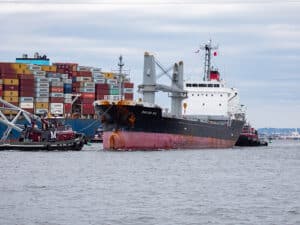
Bawat BWMS gains USCG Type Approval
Written by Nick Blenkey
The U.S. Coast Guard’s Marine Safety Center has issued the 26th U.S. Coast Guard Ballast Water Management System Type Approval certificate to Denmark’s Bawat A/S, after a detailed review of the manufacturer’s type approval application determined the system met the requirements of 46 CFR162.060.
The treatment principle of the Bawat BWMS MK2 consists of heat treatment during ballasting, de-ballasting, or internal transfers. This approval covers models with maximum intake treatment rated capacities between 50 m3/h and 5,000 cu.m/h.
Bawat says its system is the only one available to shipowners that relies on heat pasteurisation to kill off potentially dangerous aquatic organisms in ballast water instead of filters, ultraviolet lights, electrolysis systems or active chemicals.
“We are extremely pleased to have been awarded Type Approval by the US Coast Guard which has one of the toughest approval processes,” says Marcus Hummer, chief executive, Bawat, adding that this is proof that this unique system using waste heat really works.
“Most shipowners seek cost effective systems that have both the IMO Type Approval and the more stringent U.S. Coast Guard Type Approval to gain the reassurance that the technology works and their vessels can remain compliant of both international as well as local rules,” says Hummer. “A vessel without U.S. Coast Guard Type Approval, even if not operating in US waters immediately, will certainly lack future flexibility to do so.”
The Bawat system was awarded Type Approval according the updated standards set by the International Maritime Organisation in late 2019 making it now one of only a handful of systems that have both approvals.
Bawat says its system is the only treatment technology that works with only a single straight-forward pass of the ballast water through the system.
For vessels on time sensitive operational profiles this is a winning factor as it gives ship operators flexibility to treat the ballast water when it suits during the vessel’s voyage, says Bawat. Other systems on the market require the ballast water to be treated either during loading or discharge, or both, potentially influencing port stay times.
Hummer adds that the technology is highly cost-effective in that it is designed to use a ship’s own waste heat to pasteurize the ballast water.
“Our system really is unique,” says Hummer. “It uses excess heat from the ship’s engine cooling water or other excess heating sources onboard to create the heat needed to pasteurise the ballast water and kill off anything in it. So, the Bawat system is not only truly green but also offers almost zero operating costs. All other systems require vessels to generate additional power, thus having high operational costs.”
Hummer believes the system will be a winner for ships’ crews as well as shipowners, not only for its ease of use, but because its designuses only tried and tested marine components that shipboard personnel will likely have experience of, making maintenance straight forward.




